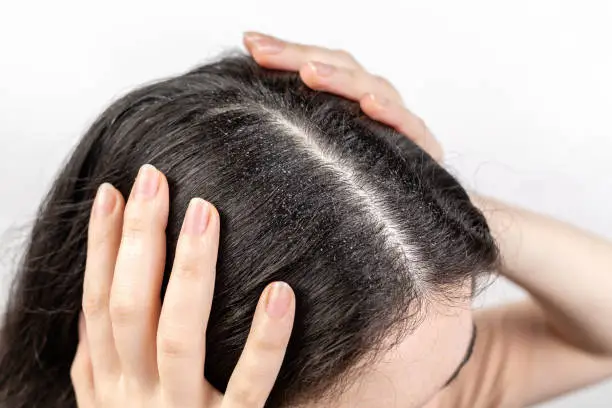Dandruff is a usual problem where the skin on your head gets flaky. It’s not something you can catch from others, and it’s not really serious. But it can be uncomfortable and hard to get rid of.
If your dandruff is not too bad, you can try using a mild shampoo every day. If that doesn’t help, there are special shampoos with medicine in them that might work better. Just remember, even if your dandruff gets better, it could come back later on.
Dandruff can be a real pain, just like dealing with an ex who want to take a hint. It’s embarrassing, persistent, and definitely not something you want to deal with. But did you know that using hair oils can actually help with dandruff? Hair oil are a safe and natural way to treat dandruff, without the risks that come with chemical-laden anti-dandruff products. Plus, they won’t harm your hair or dry out your scalp. Keep reading to find out which oils you can use to effectively treat and prevent dandruff.
What causes dandruff?
Dandruff is a common problem, especially during winter when the air gets dry. It’s important to know what causes dandruff so that you can treat it properly. Here are some common causes of dandruff:
- Scalp irritation and excess oil production: When your scalp becomes irritated and produces too much oil, it can lead to dandruff. This condition is also known as seborrheic dermatitis.
- Overgrowth of skin cells: Sometimes, there can be an excessive growth of skin cells on the scalp. This can create an environment for a yeast called Malassezia to thrive, leading to scalp irritation and dandruff.
- Harsh Air Products: Using hair products that contain chemicals can worsen scalp dermatitis and make dandruff worse.
- Not washing your scalp enough: If you don’t wash your scalp regularly, dead skin cells can build up, causing flakes and itching.
No matter what the cause of dandruff is, using the best hair oils for dandruff can be a great solution. Let’s explore the following section to find out which oils work best for treating dandruff.
6 Effective Hair Oils To Treat Dandruff
If you prefer natural solutions and want to avoid chemical-based hair Products, herbal hair oils are a great choice for dandruff treatment. Hot oil treatments can also be beneficial as they nourish your hair, promote scalp health, reduce hair fall, and encourage hair growth.
Let’s explore some of the best oils for dandruff:
- Coconut oil: Coconut oil moisturizes the scalp and improves overall health. It also helps combat the fungi that can cause dandruff.
- Rosemary oil: Rosemary oil has antimicrobial and antiseptic properties, making it effective against dandruff-causing agents. It may also alleviate scalp itching.
- Basil oil: Extracted through steam distillation, basil oil contains essential chemicals that may reduce dandruff and help treat hair loss. It may also provide relief from an itchy scalp, although more research is needed.
- Tea tree oil: Tea tree oil processes anti-fungal and antibacterial properties, making it a popular choice for relieving dandruff and soothing scalp irritation.
- Lemongrass oil: Studies have shown that lemongrass oil, when used in an anti-dandruff hair tonic, can effectively alleviate dandruff symptoms. However, further research is needed to explore its full potential.
- Peppermint oil: With its strong antimicrobial properties, peppermint oil is known to be beneficial for treating dandruff. Always check for any allergic reactions before using it.
Now that we know about these helpful oils, let’s learn how to apply anti dandruff hair oil.
How to apply anti-dandruff hair oil?
Applying anti-dandruff hair oil is simple. Just follow these steps:
- Take a few drops of the oil and gently massage it into your scalp using your fingertips.
- You can leave the oil on your hair overnight or keep it for 1 to 2 hours before washing it off.
- Remember not to use too much oil. Only apply the amount needed for your hair.
- After applying the oil, there are a few things to keep in mind, which we will discuss in the next section.
By using these natural oils and following the right application method, you can effectively combat dandruff. Say goodbye to those annoying flakes and enjoy a healthy scalp!
What to do after applying anti-dandruff hair oil?
After you have applied your chosen anti dandruff hair oil, it’s important to take some steps to protect your hair and scalp. Here’s what you should do:
- Be gentle with your hair: Avoid pulling or combing your hair roughly, whether with a brush or your fingers. The hot oil treatment can make your hair weak and pulling or tugging at it can cause breakage and hair fall.
- Avoid tight hairstyles: Try not to tie your hair tightly in ponytails or braids. Opt for looser hairstyle or use a gentle clip to secure your hair in a bun if you need to tie it up.
- Focus on the hair treatment: Using hair oil is already a treatment in itself, so there’s no need to add extra products like powdered hair masks or creamy conditioners for hydration. Too many treatments can weigh down your hair, so stick to just the oil.
- Don’t wash your hair immediately: Give the oil some time to work its magic. Avoid washing your hair right after oiling. Let the oil sit on your scalp for 1 to 2 hours to allow it to penetrate your scalp pores and nourish your hair strands.
What to consider before buying anti-dandruff oils?
Before you buy an anti-dandruff oil, it’s important to choose the right one for your specific needs. Here are some things to check before making your purchase:
- Consider you are hair type: Make sure to choose a hair oil that is suitable for your hair type. Different oils work better for different hair types, so find one that suits you best. You can also consult a dermatologist to get expert advice on which oil would work well for you.
- Look for natural ingredients: Opt for products that contain natural ingredients. Avoid oils with synthetic chemicals or harsh additives. Natural ingredients are generally gentler on your scalp and hair.
- Check the oil extraction process: Essential oil can be extracted using different methods like distillation or cold-pressing. Both methods can yield effective results, so choose an oil that has been prepared using one of these processes.
- Avoid Fragrances: If possible, choose an essential oil that doesn’t have added fragrances. Fragrances can sometimes cause irritation for certain individuals, so it’s best to opt for fragrance- free options.
By considering these factors, you can find the best anti-dandruff oil that suits your needs. However, there may be instances where it’s necessary to consult a doctor.
When You Should Seek Medical Attention?
While the hair oils mentioned in this post can be effective for many people, there are situations where it’s important to see a doctor. If you’ve been using the oils for a few weeks and haven’t seen any improvement, it’s time to seek medical advice. Additionally, if you experience any of the following symptoms, it’s crucial to visit your doctor.
- Redness on or inflammation on the scale: If you are scalp becomes red or inflamed, it could indicate that your dandruff is worsening due to an underlying reason. In such cases, chemical treatment may be necessary, and a doctor can provide the appropriate guidance.
- Excessive hair loss: If you are losing an excessive amount of hair without any apparent reason other than dandruff, it’s important to consult a doctor. They can determine if there are any underlying factors contributing to the hair loss and provide suitable treatment.
- Dandruff flakes on shoulders and clothes: If you notice dandruff flakes falling onto your shoulders and clothes, it may indicate a more severe or persistent dandruff condition. Consulting a doctor can help identify the cause and find an effective solution.
Remember, if you have any concerns or your dandruff symptoms persist despite using the recommended oils, seeking medical advice is always a wise decision.
Frequently Asked Questions
1. Can certain hair oils make rental worse or cause scalp issues?
Using too much of thick natural oils like coconut or sesame oil can make your scalp oily and worsen your dandruff. It’s important to wash your hair with an anti-dandruff shampoo after applying hair oil for better scalp hygiene.
2. Can hair oils be used or color-treated or chemically-treated hair to treat dandruff?
Yes, hair oils can help repair damage caused by color treatments or chemical treatments. However, frequently hair washing after applying oil may cause your hair color to fade faster.
3. Is Castor oil good for dandruff?
Castor oil can be a helpful remedy for dandruff. It has antibacterial and anti-fungal properties, which can effectively treat dandruff.
4. Does almond oil reduce dandruff?
Some people have found that almond oil moisturizing properties can help treat dandruff. While there is not strong scientific evidence, many have reported positive results.
5. How often should hair oils be applied to treat dandruff?
To treat dandruff, you can apply hair oils daily but in small amounts. Applying too much oil can clog your hair follicles and make your dandruff worse. It’s important to find the right balance.


